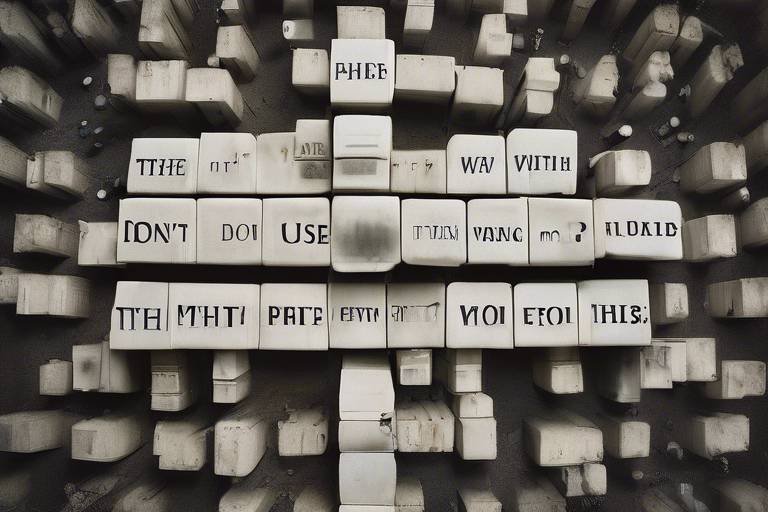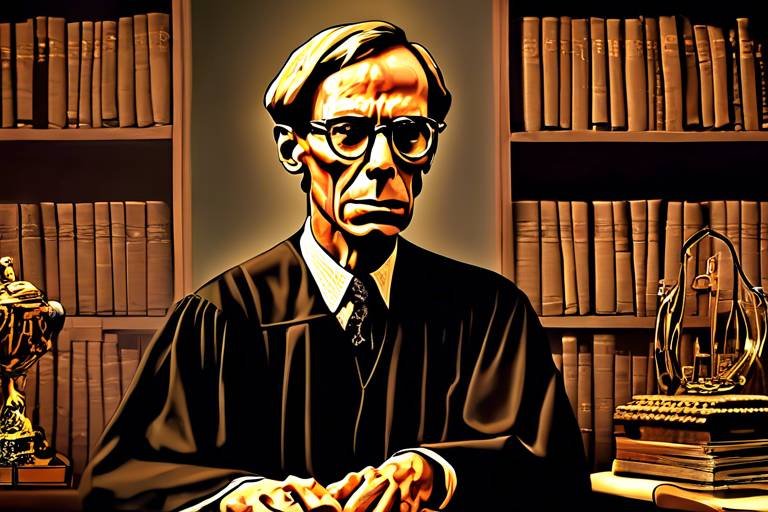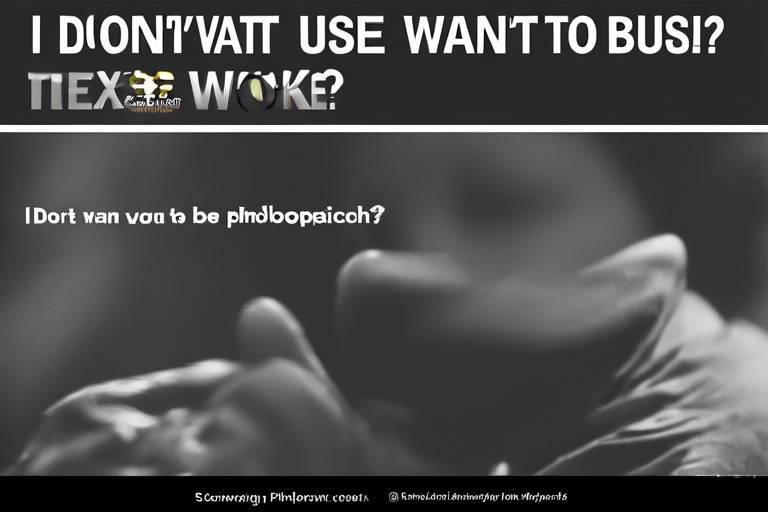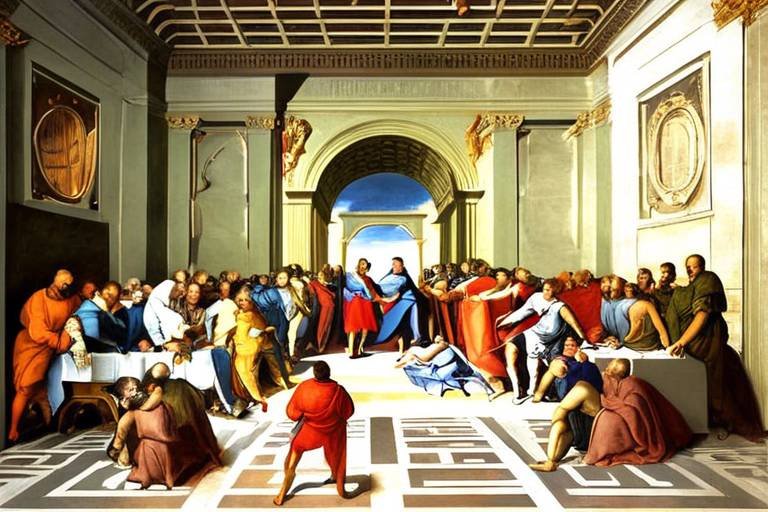Blindside of War - A Philosophical Insight
War is often seen as the ultimate breakdown of societal order, a chaotic clash of ideologies and power struggles that leaves a trail of devastation in its wake. However, beneath the surface of this turmoil lies a complex tapestry of philosophical questions that challenge our understanding of humanity and morality. What does it mean to engage in conflict? Is there ever a justifiable reason for war? As we delve into the philosophical dimensions of war, we uncover the ethical dilemmas, psychological impacts, and societal consequences that shape our perceptions of conflict. This exploration not only invites us to question the nature of war but also compels us to reflect on the human condition itself.
At the heart of any discussion about war are the ethical dilemmas it presents. The concept of just war theory emerges as a pivotal framework, attempting to delineate the circumstances under which war can be deemed morally acceptable. This theory raises essential questions: What constitutes a just cause? Is it ethical to wage war in the name of peace? The answers to these questions are often murky, clouded by conflicting interests and perspectives.
Moreover, the value of human life becomes a central theme in these discussions. The stark reality is that war often reduces individuals to mere statistics, a grim reminder of the cost of conflict. As we ponder these ethical implications, we must also consider the psychological toll on those involved, both combatants and civilians alike. The impact of war reverberates far beyond the battlefield, influencing not only the immediate participants but also the broader societal fabric.
The psychological impact of war is profound and multifaceted. It extends beyond the soldiers who fight to include civilians who endure the horrors of conflict. The scars left by war are not always visible; they manifest in the form of trauma, PTSD, and a myriad of emotional struggles that can last a lifetime. For many, the battlefield is not just a physical location but a haunting memory that shapes their identity and worldview.
To truly understand the psychological burdens carried by soldiers, it is essential to delve into their experiences. The internal conflicts faced by those who serve can be overwhelming. They grapple with the moral injuries inflicted by the very nature of combat—decisions made in the heat of battle that haunt them long after the guns have fallen silent. The struggle to reconcile their actions with their moral compass can lead to a deep sense of alienation and despair.
Combat can profoundly alter a soldier's sense of self. The transformation from civilian to warrior is not merely a change in role; it can lead to a fundamental shift in identity. Many veterans find themselves wrestling with feelings of disconnection when they return to civilian life, as they attempt to reintegrate into a world that feels foreign and unrecognizable. The journey of reclaiming one’s identity post-combat is fraught with challenges, as they navigate the complexities of their experiences and the expectations of society.
Memory plays a crucial role in how veterans process their experiences. It can be a double-edged sword, offering both a means of understanding and a source of pain. The complexities of memory, especially in relation to trauma, create a narrative that can either empower or imprison. Veterans often construct stories around their experiences, which can help in processing their trauma, yet these narratives can also become a burden as they grapple with the reality of what they have witnessed and done.
While soldiers are on the front lines, it is often civilians who bear the brunt of war's consequences. The impact of conflict on communities is profound, altering social dynamics and shaping collective memories of trauma. Civilians are not just passive victims; they are active participants in the narrative of war, their lives irrevocably changed by the violence that surrounds them. The scars of war run deep, influencing future generations and shaping societal attitudes toward conflict and peace.
War does not occur in a vacuum; it transforms societies in myriad ways. The implications of conflict extend into culture, politics, and economic structures, highlighting the interconnectedness of war and society. The aftermath of war often leads to significant shifts in cultural identity, as communities grapple with loss and seek to redefine themselves in the wake of devastation.
Conflict can redefine cultural identities, leading to both fragmentation and unity. Art, literature, and collective narratives within affected societies often reflect the struggles and resilience of those who have endured war. These expressions serve not only as a means of coping but also as a way to reclaim a sense of identity amidst chaos.
The financial burden of war can cripple economies, diverting resources away from essential services and development. The economic implications of military spending and reconstruction efforts are profound, often leading to long-term impacts on national development. Countries emerging from conflict face the daunting task of rebuilding, both physically and socially, as they strive to heal the wounds of war.
In contrast to war, the concept of peace invites a different philosophical reflection. It challenges us to consider the moral imperatives that guide societies toward non-violence. Reconciliation and forgiveness emerge as essential themes in this discourse, prompting us to ponder how we can cultivate a culture of peace in a world so often marked by conflict.
- What is just war theory? Just war theory is a doctrine that outlines the conditions under which war can be morally justified.
- How does war affect mental health? War can lead to significant psychological issues, including PTSD and trauma, impacting both soldiers and civilians.
- What are the societal impacts of war? War can transform societal structures, cultural identities, and economic conditions, often leading to long-lasting changes.
- How can societies promote peace? Societies can promote peace through reconciliation, dialogue, and addressing the root causes of conflict.

The Ethical Dilemmas of War
War is not just a clash of armies; it is a profound moral and ethical quagmire that challenges our understanding of right and wrong. As we navigate through the complex waters of conflict, we are often faced with questions that probe the very essence of our humanity. What constitutes a just cause? Is it ever permissible to take a life in the name of a greater good? These questions swirl around the philosophical debates surrounding just war theory, which seeks to establish criteria for when it is justifiable to engage in war and how warfare should be conducted.
At the heart of these discussions lies the concept of justice. The principles of just war theory can be summarized in two main categories: jus ad bellum (the right to go to war) and jus in bello (the right conduct within war). Each presents its own set of ethical dilemmas that challenge our moral compass. For instance, while some argue that a nation has the right to defend itself, others question whether the means used—such as civilian casualties or collateral damage—can ever be justified. This leads us to ponder: can we truly claim to fight for justice while simultaneously inflicting suffering on innocents?
Moreover, the ethical implications extend beyond the battlefield. The decisions made by military leaders and governments can have lasting repercussions on entire populations. The use of drone strikes, for example, raises significant ethical concerns. While they may minimize risks to soldiers, they also raise questions about accountability and the moral weight of remote warfare. Are we desensitizing ourselves to violence when we can strike from thousands of miles away, detached from the human consequences of our actions?
Furthermore, the psychological toll of war on those who fight and those who are affected by it complicates the ethical landscape. Soldiers often grapple with moral injuries, a term used to describe the emotional distress that arises from actions taken during combat that conflict with their personal values and beliefs. This can lead to profound feelings of guilt and shame, often resulting in long-term psychological issues. The ethical dilemma here is twofold: how do we reconcile the necessity of combat with the mental health of those who serve, and what responsibilities do we have to support them upon their return?
In addition to individual moral struggles, war can also create a ripple effect in society, altering our collective ethical framework. The normalization of violence and the desensitization to suffering can shift societal values, leading to a culture that may accept war as a viable solution to conflict. This transformation raises critical questions about the future of our moral landscape. Will future generations view war as an acceptable means to resolve disputes, or will they strive for peaceful resolutions?
Ultimately, the ethical dilemmas of war compel us to confront uncomfortable truths about our values and priorities. As we engage in these discussions, it is essential to remain mindful of the human cost of conflict. The challenge lies not only in understanding the philosophical implications but also in applying these insights to foster a more peaceful and just world.
- What is just war theory? Just war theory is a philosophical framework that outlines the conditions under which it is justifiable to go to war and how war should be conducted ethically.
- Can war ever be justified? While some argue that war can be justified under certain circumstances, it remains a deeply contentious issue that raises moral and ethical questions.
- What are moral injuries? Moral injuries refer to the psychological distress that arises when individuals engage in actions during warfare that conflict with their personal morals or ethics.
- How does war impact societal values? War can shift societal values, leading to desensitization to violence and a normalization of conflict as a means of resolution.

The Psychological Impact of War
War is not just a clash of weapons; it is a profound upheaval of the human psyche. The psychological toll of war extends far beyond the battlefield, affecting soldiers and civilians alike. When we think about war, we often picture the chaos of combat, but the true impact lingers long after the smoke has cleared. The scars of conflict are not always visible; they are etched into the minds and hearts of those who have experienced it. From trauma to Post-Traumatic Stress Disorder (PTSD), the ramifications of war can shape lives in ways we are only beginning to understand.
For many soldiers, returning home can feel like an impossible task. They carry with them the weight of their experiences, often struggling to reintegrate into a society that seems blissfully unaware of their internal battles. The internal conflicts faced by these individuals can be overwhelming. Imagine trying to communicate feelings of fear, guilt, and confusion to friends and family who have not shared the same experiences. It’s like trying to describe a vivid dream to someone who has never slept. This disconnect can lead to feelings of isolation and despair, further complicating their journey toward healing.
Understanding the soldier's perspective is crucial in grasping the full scope of war's psychological impact. Many veterans grapple with what is known as moral injury, a term that describes the psychological distress that arises from actions taken in conflict that contradict one’s moral beliefs. This can include feelings of guilt over surviving when comrades did not, or shame from actions taken during combat that haunt them long after the war is over. These burdens can manifest in various ways, including depression, anxiety, and substance abuse.
Combat experiences can significantly alter a soldier's sense of self. The transformation is often profound, as individuals are thrust into situations that challenge their values and beliefs. They may return home feeling like strangers in their own lives, struggling with the contrast between their past identities and their new realities. This struggle for reintegration can be likened to a caterpillar emerging from a cocoon, only to find that the world it once knew has changed entirely. The journey to reclaiming one's identity can be a long and arduous process, filled with moments of doubt and uncertainty.
Memory plays a crucial role in how veterans process their experiences. The complexities of memory can be both a blessing and a curse. On one hand, memories can serve as reminders of the camaraderie and bravery experienced during service; on the other, they can trigger painful flashbacks and intrusive thoughts. The narratives constructed around these experiences can shape one’s understanding of the war and its aftermath. For many, telling their stories becomes an essential part of healing, as it allows them to reclaim agency over their memories.
It's important to remember that civilians often bear the brunt of war's consequences. The psychological impacts on communities can be just as devastating as those felt by soldiers. Families torn apart, communities devastated, and the loss of loved ones can lead to a collective trauma that lasts for generations. The ripple effects of war shape social dynamics, influencing everything from community cohesion to mental health resources. The scars of conflict can linger in the air long after the fighting has stopped, affecting how communities remember and narrate their histories.
- What is PTSD and how does it relate to war?
PTSD, or Post-Traumatic Stress Disorder, is a mental health condition triggered by experiencing or witnessing a traumatic event, such as war. Symptoms can include flashbacks, severe anxiety, and uncontrollable thoughts about the event. - How can soldiers cope with the psychological impacts of war?
Coping strategies may include therapy, support groups, and engaging in activities that promote mental wellness, such as exercise and mindfulness practices. - What role do civilians play in the psychological aftermath of war?
Civilians can experience trauma from the effects of war, including loss, displacement, and community disruption. Their experiences are often intertwined with those of returning soldiers.

The Soldier's Perspective
When we think about war, we often focus on the grand narratives—strategies, victories, and losses. But what about the individuals who fight these battles? The soldier's perspective is a complex tapestry woven with threads of duty, fear, camaraderie, and moral conflict. Imagine standing on the precipice of chaos, where the noise of gunfire drowns out your thoughts, and the weight of your weapon feels heavier than the burden of your conscience. This is the reality for many soldiers, who navigate a landscape fraught with ethical dilemmas and psychological scars.
One of the most profound challenges soldiers face is the internal conflict between their training and their humanity. They are taught to follow orders, to protect their comrades, and to neutralize threats. Yet, when confronted with the reality of taking a life, the moral weight can be overwhelming. Many soldiers return home grappling with questions like: “Did I do the right thing?” or “What have I become?” This moral injury can be as damaging as physical wounds, leading to feelings of guilt and shame that linger long after the battle has ended.
Furthermore, the experience of combat can significantly alter a soldier's sense of identity. Before deployment, they may have seen themselves as students, fathers, or friends. However, once they step into the chaos of war, their identity can shift dramatically. They become a soldier first, often losing sight of who they were before the war. This transformation can lead to a profound sense of disconnection upon returning to civilian life, as they struggle to reconcile their wartime experiences with their former selves.
Memory plays a crucial role in this journey. Soldiers often carry vivid memories of their experiences, both good and bad. These memories can be a source of pride, reminding them of bravery and camaraderie. However, they can also haunt them, manifesting as flashbacks or nightmares. The complexity of memory in the context of war is not just about recollection; it’s about how these memories shape their understanding of themselves and their place in the world. For some, the act of sharing their stories—whether through writing, art, or conversation—can be therapeutic, allowing them to process their experiences and find meaning in their trauma.
To further illustrate the psychological burdens soldiers carry, consider the following table that outlines common psychological effects experienced by veterans:
| Psychological Effect | Description |
|---|---|
| Post-Traumatic Stress Disorder (PTSD) | A mental health condition triggered by experiencing or witnessing a traumatic event. |
| Moral Injury | The distress that results from actions, or the lack of them, which violate one's moral or ethical code. |
| Depression | A common mental health issue characterized by persistent sadness and loss of interest. |
| Anxiety Disorders | Conditions characterized by excessive fear or worry, often stemming from traumatic experiences. |
Ultimately, understanding the soldier's perspective requires empathy and a willingness to listen. Each soldier's story is unique, filled with nuances that can only be appreciated through genuine engagement. By acknowledging their struggles and triumphs, we can foster a deeper understanding of the human cost of war, and perhaps, cultivate a society that values peace over conflict. After all, every soldier is not just a warrior; they are a person, navigating the complex interplay of duty, identity, and memory in a world often marked by chaos.
- What is moral injury? Moral injury refers to the psychological distress that arises from actions or the absence of actions that violate an individual's moral or ethical beliefs.
- How can soldiers cope with PTSD? Coping strategies may include therapy, support groups, medication, and engaging in creative outlets like art or writing.
- What role does memory play in a soldier's recovery? Memory can be both a source of pain and healing; sharing experiences helps in processing trauma and rebuilding identity.

Combat and Identity
Combat is more than just a series of physical engagements; it is an experience that profoundly reshapes a soldier's identity. Imagine stepping into a world where the rules of engagement are dictated by survival rather than morality. This transformation can be jarring, as the soldier grapples with the duality of their existence—one foot in the realm of duty and honor, and the other in the shadowy depths of violence and loss.
For many, the battlefield becomes a crucible, forging a new self from the fires of conflict. The very essence of who they are can be altered, leading to a complex interplay between their pre-war identity and the persona they adopt in combat. The soldier may find themselves asking questions like, "Who am I now?" or "What have I become?" These inquiries can spiral into an identity crisis, where the lines between the soldier and the civilian blur.
Moreover, the struggle for reintegration into civilian life is often fraught with challenges. After experiencing the chaos of war, returning home can feel like stepping into a different universe. The mundane concerns of everyday life may seem trivial compared to the life-and-death decisions faced on the front lines. This dissonance can lead to feelings of isolation, as veterans may feel disconnected from friends and family who cannot fully comprehend their experiences.
Additionally, the concept of moral injury plays a significant role in this identity transformation. Soldiers may wrestle with the actions they took during combat, questioning their moral compass and the impact of their decisions. This internal conflict can lead to a profound sense of shame and guilt, complicating their journey back to a sense of normalcy. The psychological scars of combat often linger long after the physical battles have ceased, creating a complex tapestry of emotions that shape their post-war identity.
To illustrate this transformation, consider the following table that outlines the key aspects of combat's impact on identity:
| Aspect | Impact on Identity |
|---|---|
| Experience of Violence | Can lead to desensitization and altered moral perspectives. |
| Survival Instincts | Creates a focus on self-preservation over societal norms. |
| Moral Injury | Results in guilt and shame that can redefine one's self-worth. |
| Isolation | Leads to a feeling of disconnect from civilian life and relationships. |
Ultimately, the journey of reconciling who they were before the war and who they have become is a lifelong process. This struggle is not merely personal; it resonates through families and communities, as loved ones attempt to understand the changes that combat has wrought. The conversation around combat and identity is essential, as it sheds light on the challenges faced by veterans and emphasizes the need for supportive frameworks that facilitate their reintegration.
- What is moral injury? Moral injury refers to the psychological distress that results from actions taken in combat that conflict with a soldier's moral beliefs.
- How does combat affect a soldier's identity? Combat can lead to significant changes in a soldier's self-perception, often causing them to struggle with feelings of guilt, shame, and disconnection from civilian life.
- What are the common challenges faced by veterans after returning from war? Veterans often face challenges such as isolation, difficulty in reintegration, and the psychological impacts of trauma and moral injury.

The Role of Memory
Memory is a powerful force, shaping not only our individual identities but also the collective consciousness of societies. For veterans, the memories of combat can be a double-edged sword. On one hand, they serve as a testament to bravery and sacrifice; on the other, they can be a source of deep psychological pain. The complexities of memory in the context of war are vast, encompassing everything from the immediate recollections of battle to the long-term effects of trauma.
When we think about memory, it’s essential to recognize that it is not just a passive storage of experiences. Rather, it is an active process that influences how veterans perceive their past and navigate their present. Veterans often grapple with what is known as “flashbacks”, which can feel so vivid that they transport individuals back to the battlefield, making it challenging to distinguish between past and present. This phenomenon can lead to heightened anxiety and emotional distress, complicating their ability to reintegrate into civilian life.
Moreover, the narratives that veterans construct around their experiences play a crucial role in how they process their memories. These narratives can be influenced by societal perceptions of war, media portrayals, and personal reflections. For instance, a soldier might frame their experiences in a way that emphasizes heroism and duty, while another might focus on the horror and chaos they witnessed. This subjective interpretation can significantly impact their mental health and overall well-being.
Memory also interacts with the concept of “moral injury”, which refers to the psychological distress that arises from actions that conflict with one’s moral beliefs. Veterans may recall specific incidents where they felt they acted against their values, leading to guilt and shame. This internal struggle can be exacerbated by the silence surrounding these experiences, as many feel unable to share their burdens with others who might not understand the complexities of war.
To further illustrate the significance of memory in the context of war, consider the following table that outlines the different types of memories veterans might experience:
| Type of Memory | Description |
|---|---|
| Flashbacks | Intense, vivid recollections that feel like reliving the experience. |
| Traumatic Memories | Memories associated with distressing events that can cause anxiety and fear. |
| Positive Memories | Recollections that provide comfort, such as camaraderie and shared experiences. |
| Moral Injuries | Memories tied to actions that conflict with personal ethics, leading to guilt. |
In addition to individual experiences, collective memory also plays a vital role in shaping how societies remember and honor their veterans. Communities often create memorials, museums, and events to commemorate the sacrifices made during war. These collective memories can foster a sense of unity and purpose, but they can also lead to divisive narratives that exclude certain perspectives, particularly those of marginalized groups affected by war.
Ultimately, the role of memory in the lives of veterans is multifaceted and deeply intertwined with their journey towards healing and reintegration. Understanding these complexities not only helps in addressing the psychological needs of veterans but also enriches our broader understanding of the impacts of war on humanity. By acknowledging the power of memory, we can foster a more compassionate dialogue around the experiences of those who have served, paving the way for healing and reconciliation.
- What is moral injury? Moral injury refers to the psychological distress that occurs when a person feels they have violated their own moral beliefs during wartime.
- How do flashbacks affect veterans? Flashbacks can cause intense anxiety and emotional distress, making it difficult for veterans to distinguish between past experiences and present reality.
- What can communities do to support veterans? Communities can create supportive environments through awareness campaigns, mental health resources, and events that honor veterans' sacrifices.

The Civilian Experience
War is often romanticized in movies and media, but the reality for civilians is a far cry from the glorified narratives we see. When conflict erupts, it’s the innocent bystanders—families, children, the elderly—who face the brunt of its devastating consequences. Imagine waking up one day to the sounds of explosions, your neighborhood transformed into a battleground. For many, this is not just a scene from a film; it’s a daily reality. The civilian experience during war is marked by a profound sense of loss, fear, and uncertainty.
As communities are torn apart, the social fabric that holds them together begins to fray. Families are displaced, homes are destroyed, and the familiar landscape of daily life is replaced by chaos. The psychological impact of such upheaval can be staggering. Civilians often grapple with feelings of helplessness and despair, leading to long-term mental health issues. In fact, studies have shown that civilians exposed to conflict are at a higher risk of developing conditions such as depression and anxiety.
Moreover, the trauma experienced by civilians is not just individual; it ripples through communities, shaping collective memory and identity. Survivors of war often share stories of loss and survival, creating a tapestry of experiences that define their community’s narrative. This shared history can foster resilience, as communities come together to support one another in the aftermath of conflict. However, it can also lead to divisions, as differing perspectives on the war can create rifts within the very fabric of society.
To illustrate the civilian experience further, consider the following table that highlights key aspects of how war impacts civilian life:
| Aspect | Impact |
|---|---|
| Displacement | Millions are forced to flee their homes, leading to refugee crises. |
| Loss of Life | Countless civilians lose their lives, often as collateral damage. |
| Psychological Trauma | Increased rates of PTSD, depression, and anxiety among affected populations. |
| Economic Hardship | Destruction of infrastructure leads to unemployment and poverty. |
| Social Fragmentation | Communities can become divided, leading to long-lasting tensions. |
In the aftermath of war, the rebuilding process is fraught with challenges. Communities must not only reconstruct physical structures but also mend the emotional wounds inflicted by conflict. This process often involves addressing the grievances of those who have suffered and finding ways to foster reconciliation. It’s a complex journey that requires understanding, empathy, and a commitment to healing.
Ultimately, the civilian experience in war is a poignant reminder of the true cost of conflict. It challenges us to consider the ethical implications of our actions and the responsibilities we hold towards those who suffer in silence. As we reflect on these realities, we must ask ourselves: How can we create a world where the civilian experience is no longer defined by fear and loss, but by peace and hope?
- What are the primary effects of war on civilians? Civilians face displacement, loss of life, psychological trauma, economic hardship, and social fragmentation.
- How does war impact mental health? Exposure to conflict can lead to increased rates of PTSD, anxiety, and depression among civilians.
- What role do civilians play in post-war recovery? Civilians are crucial in rebuilding communities and fostering reconciliation, addressing both physical and emotional wounds.
- Can war change cultural identities? Yes, war can redefine cultural identities, leading to both fragmentation and unity within affected communities.

The Societal Consequences of War
War is not just a series of battles fought on distant fields; it is a seismic event that reverberates through the very fabric of society. The consequences of war extend far beyond the immediate loss of life and destruction of property. They ripple through communities, altering social dynamics, political landscapes, and economic structures. In essence, war reshapes the identity of nations and their people, often in ways that are both profound and unsettling.
To understand the societal consequences of war, we must first recognize that conflict does not occur in isolation. It is intertwined with the cultural, economic, and political threads that hold societies together. For instance, during and after a war, we often see shifts in power dynamics, where certain groups may gain prominence while others are marginalized. This can lead to a redefinition of social hierarchies and relationships, creating an environment ripe for both unity and division.
Moreover, the psychological scars left by war do not just affect the soldiers who fight; they permeate civilian life and can alter community structures. Families are torn apart, friendships are strained, and entire communities can be left grappling with collective trauma. The impact on mental health is staggering. According to various studies, a significant percentage of war-affected populations experience mental health issues such as depression, anxiety, and PTSD. This psychological burden can hinder social cohesion and impede recovery efforts.
Furthermore, the economic consequences of war are often devastating. The costs of military spending can divert crucial resources away from essential services like education and healthcare. Reconstruction efforts can be daunting, and the long-term impacts on national development are frequently felt for generations. For example, consider the aftermath of the Iraq War. The financial repercussions were staggering, leading to a significant drain on the economy and affecting the everyday lives of citizens. The following table illustrates the economic costs associated with war:
| Type of Cost | Estimated Amount (in billions) |
|---|---|
| Military Spending | 800 |
| Reconstruction Efforts | 200 |
| Long-term Economic Impact | 500 |
This table highlights just a fraction of the financial toll that war can take on a nation. The effects are not just immediate; they linger, affecting generations to come. Children born into war-torn societies may inherit a legacy of instability and poverty, making it difficult for them to envision a brighter future.
In addition to economic and psychological impacts, war also influences cultural identity. It can lead to a fragmentation of cultural narratives, where communities may struggle to find common ground amidst the chaos. Yet, paradoxically, war can also foster unity among certain groups, as shared experiences of conflict can create bonds that transcend previous divisions. Art, literature, and collective memory often reflect this duality, capturing both the pain and resilience of societies in turmoil.
Ultimately, the societal consequences of war are complex and multifaceted. They challenge our understanding of community, identity, and the very essence of humanity. As we reflect on these consequences, it becomes evident that the impact of war extends far beyond the battlefield, shaping the lives of countless individuals and the societies they inhabit.
- What are the immediate societal impacts of war? The immediate impacts include loss of life, destruction of infrastructure, and psychological trauma among both combatants and civilians.
- How does war affect economic structures? War can lead to significant military spending, diverting resources from essential services, and it can cripple economies, making recovery challenging.
- What role does culture play in the aftermath of war? War can redefine cultural identities, leading to both fragmentation and unity, influencing art, literature, and collective narratives.
- How does war impact mental health in societies? War often results in increased rates of PTSD, anxiety, and depression among both soldiers and civilians, affecting community cohesion.

War and Cultural Identity
War is not just a series of battles fought on the front lines; it is a profound event that reshapes the very fabric of cultural identity. When conflict erupts, it often brings to the surface deep-seated beliefs, values, and narratives that define a community. The impact of war on cultural identity can be both fragmenting and unifying, creating a complex tapestry of experiences that influences how societies perceive themselves and their place in the world.
During times of war, the stories told through art, literature, and music often reflect the collective trauma and resilience of those involved. Artists and writers become the chroniclers of their times, capturing the essence of struggle and survival. For example, consider how the poetry of World War I encapsulated the disillusionment of a generation. These cultural expressions serve not only as a means of coping but also as a way to forge a shared identity among those who have experienced the same hardships.
Moreover, war can lead to a redefinition of cultural identity. In many cases, communities may find themselves grappling with their historical narratives and the values they hold dear. For instance, after a conflict, societies often reassess their heroes and villains, leading to a re-evaluation of cultural symbols. This can foster a sense of unity among those who have endured similar experiences, but it can also create divisions as differing perspectives clash.
To illustrate this point, let’s consider the following table that highlights some of the key ways war influences cultural identity:
| Impact of War | Positive Outcomes | Negative Outcomes |
|---|---|---|
| Artistic Expression | New forms of art emerge, capturing the essence of human experience. | Art may become propaganda, serving divisive purposes. |
| Historical Narratives | Re-examination of history can lead to reconciliation and healing. | Conflicting narratives can create societal rifts. |
| Community Bonds | Shared experiences can strengthen community ties. | Trauma can lead to isolation and fragmentation. |
Additionally, the aftermath of war often sees a rise in cultural movements aimed at healing and rebuilding identity. These movements can be crucial in helping societies move forward, as they emphasize forgiveness and reconciliation. The struggle for a collective identity can lead to the creation of memorials, museums, and cultural festivals that honor those lost and celebrate resilience. However, the challenge remains: how do we honor the past while also forging a new identity that encompasses the diverse experiences of all affected?
In conclusion, the relationship between war and cultural identity is intricate and multifaceted. While war can disrupt and challenge the very essence of cultural identity, it also provides opportunities for growth, reflection, and transformation. The stories we tell and the identities we forge in the wake of conflict will shape the future, reminding us that even in the darkest times, there is potential for renewal and understanding.
- How does war influence cultural identity?
War can reshape cultural identity by bringing to light shared experiences, altering historical narratives, and fostering new forms of artistic expression. - What role does art play in post-war societies?
Art serves as a means of coping, chronicling experiences, and fostering unity among communities affected by conflict. - Can war lead to positive cultural changes?
Yes, while war often brings trauma, it can also lead to movements focused on reconciliation and the rebuilding of cultural identity.

The Economic Costs of War
War is not just a clash of arms; it is a profound economic upheaval that reverberates through nations and communities for generations. The financial burden of war can be staggering, leading to a cascade of effects that can cripple economies and alter the course of national development. Imagine a country pouring billions of dollars into military efforts, only to find its infrastructure crumbling and its citizens struggling to make ends meet. This is the harsh reality many nations face in the aftermath of conflict.
The costs of war can be categorized into several key areas, each with its own implications for society. First, there are the immediate costs associated with military operations, which include not only the expenses of deploying troops and equipment but also the long-term costs of veteran care and rehabilitation. According to estimates, the United States has spent over $6 trillion on military engagements since 2001, a figure that highlights the staggering financial toll of prolonged conflict.
Beyond direct military costs, wars often lead to significant economic disruptions. Infrastructure can be devastated, businesses can collapse, and the labor force can be drastically affected. For instance, in countries like Iraq and Afghanistan, the destruction of roads, schools, and hospitals has set back economic progress by decades. The ripple effects extend into global markets, affecting trade and investment, as uncertainty and instability deter both domestic and foreign investment.
To illustrate the impact of war on economic structures, consider the following table that summarizes some of the key economic consequences of military conflict:
| Economic Consequence | Description |
|---|---|
| Infrastructure Damage | Destruction of roads, bridges, and utilities, leading to increased costs for reconstruction. |
| Displacement of Populations | Mass migration of people can strain resources in host countries and disrupt local economies. |
| Increased National Debt | Funding wars often leads to increased borrowing, which can burden future generations. |
| Loss of Human Capital | Casualties and injuries reduce the available workforce, impacting productivity and economic growth. |
Moreover, the economic costs of war extend beyond mere numbers. They manifest in the form of lost opportunities and diminished quality of life for countless individuals. Families may find themselves struggling to afford basic necessities as resources are diverted to military spending. Education systems can falter, leaving a generation without the tools needed to build a prosperous future. The psychological scars of war often translate into economic challenges, as veterans and civilians alike grapple with the aftermath of trauma, which can hinder their ability to contribute to society.
In light of these challenges, it is essential for policymakers to consider the long-term economic implications of military actions. Investing in peace and stability may seem costly upfront, but the benefits of a peaceful society—where individuals can thrive and economies can grow—far outweigh the expenses associated with war. As we reflect on the economic costs of war, we must ask ourselves: is the price of conflict worth the toll it takes on humanity and our shared future?
- What are the main economic impacts of war on a country?
The main economic impacts include infrastructure damage, increased national debt, loss of human capital, and disruption of local economies.
- How does war affect civilian life economically?
War can lead to job losses, rising prices for goods and services, and decreased access to education and healthcare.
- What can governments do to mitigate the economic costs of war?
Governments can focus on investing in peacebuilding initiatives, supporting veterans' reintegration, and prioritizing reconstruction efforts to rebuild affected areas.

Philosophical Reflections on Peace
When we think about peace, it often evokes images of calm landscapes and harmonious societies. However, peace is not merely the absence of war; it is a complex tapestry woven from the threads of reconciliation, forgiveness, and a profound understanding of human dignity. Philosophically, peace challenges us to examine our values and the moral imperatives that guide our actions. It compels us to ask: what does it truly mean to live in peace? Is it simply the lack of conflict, or is it something deeper, more intrinsic to our humanity?
To explore this, we can look at the idea of reconciliation. This process is not just about settling disputes or achieving a ceasefire; it is about mending the fabric of relationships that have been torn apart by conflict. Reconciliation requires us to confront the past, acknowledge the pain caused, and actively work towards healing. It’s like piecing together a shattered vase; the cracks remain, but with care, the vase can still hold beauty and function.
Forgiveness plays a pivotal role in this philosophical reflection on peace. It’s often misunderstood as condoning the actions of those who have wronged us. Instead, true forgiveness liberates us from the shackles of resentment. It’s akin to releasing a balloon into the sky; while it may feel difficult to let go, the act of forgiveness allows us to rise above our grievances and find a sense of freedom. Philosophers like Hannah Arendt have argued that forgiveness is essential for political and personal healing, as it opens pathways to dialogue and understanding.
Moreover, the moral imperatives guiding societies toward non-violence cannot be overlooked. These imperatives challenge us to cultivate a culture of peace, where empathy and compassion are prioritized over aggression and hostility. This cultural shift can be seen in movements advocating for social justice, where peaceful protest and dialogue replace violence as means of achieving change. In this light, peace becomes an active pursuit, a commitment to nurturing relationships and fostering understanding.
In contemplating peace, we must also consider the role of collective memory. How societies remember their conflicts shapes their future interactions and the potential for peace. For instance, communities that engage in honest dialogues about their past, including the injustices faced and the lessons learned, often cultivate a stronger foundation for peace. This can be illustrated in the aftermath of conflicts, where truth and reconciliation commissions have been established to address grievances and promote healing.
As we reflect on these philosophical dimensions of peace, it becomes clear that achieving a peaceful society is not a passive endeavor. It requires active participation from individuals and communities alike. We must ask ourselves: how can we contribute to a culture of peace in our daily lives? Whether through acts of kindness, fostering open dialogue, or standing against injustice, each action, no matter how small, contributes to the larger tapestry of peace.
In conclusion, peace is not merely a destination; it is a journey that demands our engagement, understanding, and commitment. As we navigate this path, let us remember the intricate connections between forgiveness, reconciliation, and moral responsibility. By embracing these principles, we can work towards a world where peace is not just an ideal, but a lived reality for all.
- What is the difference between peace and absence of war? Peace encompasses a state of harmony and justice, while the absence of war may simply mean a lack of active conflict.
- How can individuals contribute to peace? Individuals can promote peace through acts of kindness, engaging in dialogue, and advocating for social justice.
- What role does forgiveness play in achieving peace? Forgiveness helps release resentment and opens pathways for healing and understanding, making it essential for personal and societal peace.
- How does collective memory influence peace? Societies that engage in honest dialogues about their past can create stronger foundations for future peace.
Frequently Asked Questions
- What are the ethical dilemmas associated with war?
War presents complex ethical dilemmas, primarily revolving around questions of justice, morality, and the value of human life. Philosophers debate the principles of just war theory, which seeks to determine when it is morally permissible to engage in war and how to conduct it ethically. These discussions often highlight the challenges of balancing national interests with humanitarian concerns.
- How does war impact the psychology of soldiers?
The psychological impact of war on soldiers can be profound and lasting. Many veterans experience trauma and conditions such as PTSD, which can affect their mental health long after they return home. The internal conflicts they face, including moral injuries from their actions during combat, can lead to a struggle with identity and reintegration into civilian life.
- What is the civilian experience during wartime?
Civilians often suffer the most during conflicts, bearing the brunt of violence and displacement. The effects of war on communities can reshape social dynamics, influence collective memory, and result in long-term trauma. Understanding the civilian perspective is crucial for grasping the full impact of war on society.
- How does war transform societies?
War has the power to transform societies in profound ways. It can alter cultural identities, lead to economic strain, and affect political structures. The interconnectedness of war and society means that the consequences of conflict are felt across various facets of life, from art and literature to economic development and governance.
- What philosophical reflections can we make about peace?
In contrast to the chaos of war, peace is often viewed through the lens of reconciliation and forgiveness. Philosophical discussions surrounding peace emphasize the moral imperatives that guide societies toward non-violence, exploring how understanding and empathy can pave the way for lasting harmony.


















